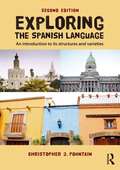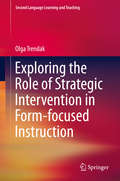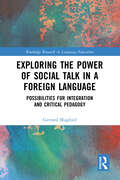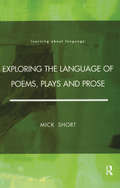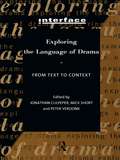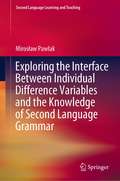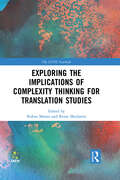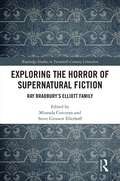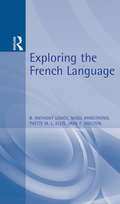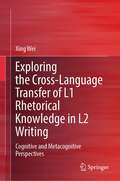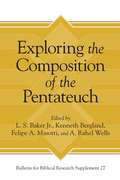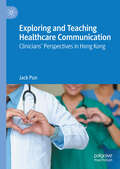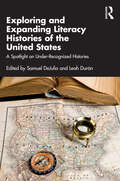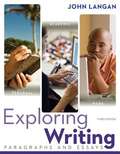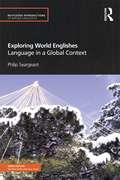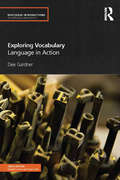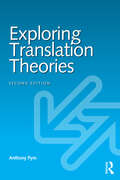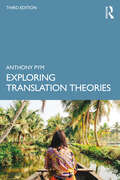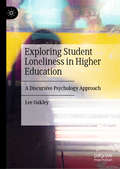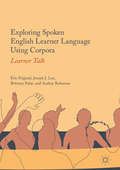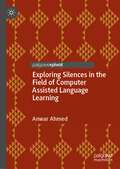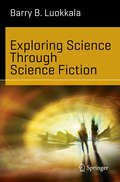- Table View
- List View
Exploring the Spanish Language: An Introduction to its Structures and Varieties
by Christopher PountainExploring the Spanish Language is a practical introduction to the structures and varieties of Spanish. This new edition provides updated samples that introduce the varieties of modern Spanish, its main registers and styles, including a greater percentage from Latin America. Written specifically with English-speaking learners of Spanish in mind, readers will find a good deal of practical help in developing skills such as pronunciation and the appropriate use of register. No previous knowledge of linguistics is assumed and a glossary of technical terms, in conjunction with exercises and activities, helps to reinforce key points. Exploring the Spanish Language is ideal for students taking courses on Spanish language and linguistics and provides an ideal foundation for research of the Spanish speaking world.
Exploring the Role of Strategic Intervention in Form-focused Instruction
by Olga TrendakThe monograph is devoted to the notion of strategic intervention and its application in the foreign language classroom, in particular with reference to teaching grammar structures. The first four chapters, which are theoretical in nature, address such concepts as form-focused instruction, language learning strategies and strategies-based instruction. The last chapter provides insight into the results of a study investigating the grammar learning strategies employed by advanced learners of English. Additionally, the chapter presents the views of foreign language teachers on the idea of introducing strategy training in the foreign language classroom. The book closes with the discussion concerning the implementation of strategy training and its value in teaching target language grammar.
Exploring the Power of Social Talk in a Foreign Language: Possibilities for Integration and Critical Pedagogy (Routledge Research in Language Education)
by Gerrard MugfordThis book examines the fundamental interactional dimension to foreign language communication, including the establishment, development, consolidation and maintenance of interpersonal relations. It argues that interpersonal language use such as small talk, casual conversation and gossipy talk is not only key to meaningful and productive communication but that it is an essential dimension with respect to successful foreign language interaction and that engaging in interpersonal language is communicatively valuable and worthwhile in its own right. Crucially, it explores how teaching and learning can utilize the role of social talk and relational engagement in helping interactants to express, voice and convey their own values, attitudes and beliefs. Finally, it develops a critical relational pedagogy focused on language speakers’ needs, objectives and desires. Redressing the imbalance between transactional and interactional language teaching, and stressing the importance of phatic and relational language use in helping language users achieve their communicative goals, it will appeal to researchers, postgraduates, and scholars in the fields of education and linguistics.
Exploring the Language of Poems, Plays and Prose (Learning About Language Ser.)
by Mick ShortExploring the Language of Poems, Plays and Prose examines how readers interact with literary works, how they understand and are moved by them. Mick Short considers how meanings and effects are generated in the three major literary genres, carying out stylistic analysis of poetry, drama and prose fiction in turn. He analyses a wide range of extracts from English literature, adopting an accessible approach to the analysis of literary texts which can be applied easily to other texts in English and in other languages.
Exploring the Language of Drama: From Text to Context (Interface)
by Jonathan Culpeper Mick Short Peter VerdonkExploring the Language of Drama introduces students to the stylistic analysis of drama. Written in an engaging and accessible style, the contributors use techniques of language analysis, particularly from discourse analysis, cognitive linguistics and pragmatics, to explore the language of plays.The contributors demonstrate the validity of analysing the text of a play, as opposed to focusing on performance. Divided into four broad, yet interconnecting groups, the chapters:* open up some of the basic mechanisms of conversation and show how they are used in dramatic dialogue* look at how discourse analysis and pragmatic theories can be used to help us understand characterization in dialogue* consider some of the cognitive patterns underlying dramatic discourse* focus on the notion of speech as action.there is also a chapter on how to analyse an extract from a play and write up an assignment.
Exploring the Interface Between Individual Difference Variables and the Knowledge of Second Language Grammar (Second Language Learning and Teaching)
by Mirosław PawlakThe last few decades have seen extensive research focusing of the relative effectiveness of different instructional options that can be employed in teaching grammar structures (e.g., deduction and induction, different types of corrective feedback, input-based vs. output-based practice). However, the contribution of such pedagogical intervention and the resulting knowledge of target language grammar are mediated by a number of factors related to a specific context, the properties of the features being taught and, most importantly, individual learner profiles. Nonetheless, research into the moderating role of individual difference variables has been scant, limited to only several factors, and seldom taking into account complex interactions between variables. The book seeks to fill this evident gap by investigating the mediating effect of selected cognitive and affective factors on explicit and implicit (or highly automatized) knowledge of the English passive voice. In doing so, the study sheds the so-much-needed light on the predictors of second language grammar knowledge but also, to some extent, on the usefulness of instructional techniques used to develop it.
Exploring the Implications of Complexity Thinking for Translation Studies (The IATIS Yearbook)
by Kobus MaraisExploring the Implications of Complexity Thinking for Translation Studies considers the new link between translation studies and complexity thinking. Edited by leading scholars in this emerging field, the collection builds on and expands work done in complexity thinking in translation studies over the past decade. In this volume, the contributors address a variety of implications that this new approach holds for key concepts in Translation Studies such as source vs. target texts, translational units, authorship, translatorship, for research topics including translation data, machine translation, communities of practice, and for research methods such as constraints and the emergence of trajectories. The various chapters provide valuable information as to how research methods informed by complexity thinking can be applied in translation studies. Presenting theoretical and methodological contributions as well as case studies, this volume is of interest to advanced students, academics, and researchers in translation and interpreting studies, literary studies, and related areas.
Exploring the Horror of Supernatural Fiction: Ray Bradbury’s Elliott Family (Routledge Studies in Twentieth-Century Literature)
by Steve Gronert Ellerhoff Miranda CorcoranDetailing the adventures of a supernatural clan of vampires, witches, and assorted monstrosities, Ray Bradbury’s Elliott family stories are a unique component of his extensive literary output. Written between 1946 and 1994, Bradbury eventually quilted the stories together into a novel, From the Dust Returned (2001), making it a creative project that spanned his adult life. Not only do the stories focus on a single familial unit, engaging with overlapping twentieth-century themes of family, identity and belonging, they were also unique in their time, interrogating post-war American ideologies of domestic unity while reinventing and softening gothic horror for the Baby Boomer generation. Centred around diverse interpretations of the Elliott Family stories, this collection of critical essays recovers the Elliotts for academic purposes by exploring how they form a collective gothic mythos while ranging across distinct themes. Essays included discuss the diverse ways in which the Elliott stories pose questions about difference and Otherness in America; engage with issues of gender, sexuality, and adolescence; and interrogate complex discourses surrounding history, identity, community, and the fantasy of family.
Exploring the French Language
by Nigel Armstrong R Lodge Jane Shelton Yvette EllisDo you know what 'verlan' or French 'backslang' is? Was President Mitterand 'câblé'? The French language is more than just a tool for communication; it has a crucial role to play in how native speakers of French think about the world and about themselves and their culture. This book helps students develop a systematic 'linguistic' approach to French. It covers the core topics, ranging from the structure and sounds of the language to discourse and everyday conversation. No previous knowledge of linguistics is assumed and a glossary of technical terms and many exercises and activities help reinforce key points. Students will find that their understanding and enjoyment of the French language is greatly enhanced by this book.
Exploring the Cross-Language Transfer of L1 Rhetorical Knowledge in L2 Writing: Cognitive and Metacognitive Perspectives
by Xing WeiThis book addresses the transfer of rhetorical knowledge from a first language (L1) to a second language (L1-to-L2 rhetorical transfer), a common cognitive phenomenon in the L2 writing of students in foreign language learning environments. It investigates L1-to-L2 rhetorical transfer from a cognitive perspective and examines a specific component of L2 writers’ agency in this transfer, namely metacognition. The book’s ultimate goal is to enhance our understanding of the cognitive mechanism of rhetorical transfer across languages. This goal is in turn connected to the need to determine how L1 rhetorical knowledge can be steered and oriented toward successful L2 writing.To this end, this book proposes a theoretical framework for transfer studies, encompassing the dimensions of text, transfer agency, and L2 essay raters. It facilitates an in-depth exploration of the intricacies involved in L1-to-L2 rhetorical transfer. It then presents empirical studies on this transfer. Embracing a dynamic perspective, this book furthers our understanding of interlingual rhetorical transfer as a conscious or intuitive process for making meaning, one that can be monitored and steered. Moreover, it discusses the pedagogical implications for L2 writing instruction that guides students to use metacognition to transfer L1 rhetorical knowledge during L2 writing.
Exploring the Composition of the Pentateuch (Bulletin for Biblical Research Supplement #27)
by L. S. Baker Kenneth Bergland Felipe A. Masotti A. Rahel WellsFor many years, the historical-critical quest for a reconstruction of the origin(s) and development of the Pentateuch or Hexateuch has been dominated by the documentary hypothesis, the heuristic power of which has produced a consensus so strong that an interpreter who did not operate within its framework was hardly regarded as a scholar. However, the relentless march of research on this topic has continued to yield new and refined analyses, data, methodological tools, and criticism. In this spirit, the contributions to this volume investigate new ideas about the composition of the Pentateuch arising from careful analysis of the biblical text against its ancient Near Eastern background.Covering a wide spectrum of topics and diverging perspectives, the chapters in this book are grouped into two parts. The first is primarily concerned with the history of scholarship and alternative approaches to the development of the Pentateuch. The second focuses on the exegesis of particular texts relevant to the composition of the Torah. The aim of the project is to foster investigation and collegial dialogue in a spirit of humility and frankness, without imposing uniformity.In addition to the editors, the contributors include Tiago Arrais, Richard E. Averbeck, John S. Bergsma, Joshua A. Berman, Daniel I. Block, Richard Davidson, Roy E. Gane, Duane A. Garrett, Richard S. Hess, Benjamin Kilchör, Michael LeFebvre, Jiří Moskala, and Christian Vogel.
Exploring the Composition of the Pentateuch (Bulletin for Biblical Research Supplement #27)
by L. S. Baker Kenneth Bergland Felipe A. Masotti A. Rahel WellsFor many years, the historical-critical quest for a reconstruction of the origin(s) and development of the Pentateuch or Hexateuch has been dominated by the documentary hypothesis, the heuristic power of which has produced a consensus so strong that an interpreter who did not operate within its framework was hardly regarded as a scholar. However, the relentless march of research on this topic has continued to yield new and refined analyses, data, methodological tools, and criticism. In this spirit, the contributions to this volume investigate new ideas about the composition of the Pentateuch arising from careful analysis of the biblical text against its ancient Near Eastern background.Covering a wide spectrum of topics and diverging perspectives, the chapters in this book are grouped into two parts. The first is primarily concerned with the history of scholarship and alternative approaches to the development of the Pentateuch. The second focuses on the exegesis of particular texts relevant to the composition of the Torah. The aim of the project is to foster investigation and collegial dialogue in a spirit of humility and frankness, without imposing uniformity.In addition to the editors, the contributors include Tiago Arrais, Richard E. Averbeck, John S. Bergsma, Joshua A. Berman, Daniel I. Block, Richard Davidson, Roy E. Gane, Duane A. Garrett, Richard S. Hess, Benjamin Kilchör, Michael LeFebvre, Jiří Moskala, and Christian Vogel.
Exploring and Teaching Healthcare Communication: Clinicians’ Perspectives in Hong Kong
by Jack PunThis book brings together frontline clinicians from diverse healthcare fields—including Medicine, Intensive Care, Neurology, Geriatrics, Oncology, Palliative Care, Nursing, Traditional Chinese Medicine, and Veterinary Medicine—to share their insights, experiences, and strategies for effective clinical communication. Drawing on research and real-world practices, the author provides evidence-based and practical recommendations for teaching, studying, and implementing effective communication in healthcare. Special attention is given to the role of cultural expectations, particularly in bilingual and multicultural medical contexts. Using Hong Kong as a case study, the book explores its unique integration of Western and Chinese values to offer a comparative perspective applicable to other healthcare settings worldwide. It argues for the development of a culturally appropriate communication model, informed by clinicians&’ insights, to enhance therapeutic relationships and ensure patient safety. This book is an essential resource for medical educators, healthcare professionals, doctors and nurses in training, medical students, health communication researchers, and scholars in applied linguistics and related fields.
Exploring and Expanding Literacy Histories of the United States: A Spotlight on Under-Recognized Histories
by Samuel DeJulio Leah DuránExploring and Expanding Literacy Histories of the United States brings together new scholarship and critical perspectives hitherto missing from dominant narratives to offer a racially, ethnically, and linguistically diverse record of the history of American reading instruction. This book addresses the many important developments in the history of literacy in the United States that occurred outside of mainstream public education, in marginalized communities in and outside of traditional school contexts.Instead of a “top-down” approach of prominent thinkers and theorists, the book intends to cover key blind spots, including literacy education in Indigenous nations, and how marginalized groups have fought for access to education, by applying a critical lens to the under-recognized histories of literacy.This volume is essential reading for courses on History of Reading Education and Foundations of Literacy.
Exploring Writing: Paragraphs and Essays (Third Edition)
by John LanganGrounded in John Langan's Four Bases - unity, coherence, sentence skills, and support - Exploring Writing employs a unique personalized learning plan to address student deficits in grammar and mechanics and to free instructional time for activities emphasizing writing process and critical thinking.
Exploring World Englishes: Language in a Global Context (Routledge Introductions to Applied Linguistics)
by Philip SeargeantRoutledge Introductions to Applied Linguistics is a series of introductory level textbooks covering the core topics in Applied Linguistics, primarily designed for those beginning postgraduate studies, or taking an introductory MA course as well as advanced undergraduates. Titles in the series are also ideal for language professionals returning to academic study. The books take an innovative 'practice to theory' approach, with a 'back-to-front' structure. This leads the reader from real-world problems and issues, through a discussion of intervention and how to engage with these concerns, before finally relating these practical issues to theoretical foundations. Additional features include tasks with commentaries, a glossary of key terms, and an annotated further reading section. In this book Philip Seargeant surveys varieties of English existing within the world today, and the debates and controversies surrounding its present forms, functions and status in diverse world contexts. It examines how English has evolved to become a ‘global language’ and looks at the political and cultural history that has influenced this evolution. Beginning with a discussion of real-life challenges relating to world Englishes that are faced by language professionals – particularly in the contexts of language education and language planning – the book explores and illustrates the ways in which the actual use and management of English, as well as the beliefs and ideologies associated with it, play an increasingly important role in contemporary globalized society.
Exploring Vocabulary: Language in Action (Routledge Introductions to Applied Linguistics)
by Dee GardnerRoutledge Introductions to Applied Linguistics is a series of introductory level textbooks covering the core topics in Applied Linguistics, primarily designed for those beginning postgraduate studies, or taking an introductory MA course as well as advanced undergraduates. Titles in the series are also ideal for language professionals returning to academic study. The books take an innovative 'practice to theory' approach, with a 'back-to-front' structure. This leads the reader from real-world problems and issues, through a discussion of intervention and how to engage with these concerns, before finally relating these practical issues to theoretical foundations. Additional features include tasks with commentaries, a glossary of key terms, and an annotated further reading section. Vocabulary is the foundation of language and language learning and as such, knowledge of how to facilitate learners’ vocabulary growth is an indispensable teaching skill and curricular component. Exploring Vocabulary is designed to raise teachers’ and students’ awareness of the interplay between the linguistic, psychological, and instructional aspects of vocabulary acquisition. It focuses on meeting the specific vocabulary needs of English language learners in whatever instructional contexts they may be in, with a special emphasis on addressing the high-stakes needs of learners in academic settings and the workplace. Dee Gardner also introduces a new Common Core Vocabulary, constructed from two of the most well-known and contemporary corpora of English—the British National Corpus and the Corpus of Contemporary American English. Exploring Vocabulary is an essential book for undergraduate and postgraduate students studying vocabulary within Applied Linguistics, TESOL, or Teacher Education, as well as any teacher working with English language learners.
Exploring Translation Theories
by Anthony PymExploring Translation Theories presents a comprehensive analysis of the core contemporary paradigms of Western translation theory. The book covers theories of equivalence, purpose, description, uncertainty, localization, and cultural translation. This second edition adds coverage on new translation technologies, volunteer translators, non-lineal logic, mediation, Asian languages, and research on translators’ cognitive processes. Readers are encouraged to explore the various theories and consider their strengths, weaknesses, and implications for translation practice. The book concludes with a survey of the way translation is used as a model in postmodern cultural studies and sociologies, extending its scope beyond traditional Western notions. Features in each chapter include: An introduction outlining the main points, key concepts and illustrative examples. Examples drawn from a range of languages, although knowledge of no language other than English is assumed. Discussion points and suggested classroom activities. A chapter summary. This comprehensive and engaging book is ideal both for self-study and as a textbook for Translation theory courses within Translation Studies, Comparative Literature and Applied Linguistics.
Exploring Translation Theories
by Anthony PymExploring Translation Theories presents a comprehensive analysis of the core contemporary paradigms of Western translation theory. This engaging overview covers the key theories of equivalence, solution types, purpose, scientific approaches, uncertainty, automation, and cultural translation. Fully revised, this third edition adds coverage of Russian and Ukrainian theories, examples from Chinese, advances in machine translation, and research on translators’ cognitive processes. Readers are encouraged to explore the various theories and consider their strengths, weaknesses, and implications for translation practice. The book concludes with a survey of the way translation is used as a model in postmodern cultural studies and sociologies, extending its scope beyond traditional Western notions. Features in each chapter include: An introduction outlining the main points, key concepts and illustrative examples. Examples drawn from a range of languages, although knowledge of no language other than English is assumed. Discussion points and suggested classroom activities. A chapter summary. This comprehensive and engaging book is ideal both for self-study and as a textbook for Translation theory courses within Translation Studies, Comparative Literature and Applied Linguistics.
Exploring Themes in Literature: Fifth Edition
by Bju PressExploring Themes in Literature is divided into six units, each reflecting a different theme: love, community, transformation, justice, perseverance, and purpose. This book contains a broad range of literature in a variety of genres from varying time periods and cultures. Every unit begins with a two-page illustration that relates to the theme of the unit. Each unit poses an Essential Question that provides engaging topics for discussion. The Essential Question also links each selection to the theme of the unit. Unit Opener questions motivate you to think about the unit's theme and consider the Bible's teaching as you respond to the questions. Unit Objectives provide goals that you will accomplish by the end of the unit. The Unit Contents furnish a map to guide your reading.
Exploring The Limits of The Human Through Science Fiction
by Gerald Alva MillerThrough its engagement with different kinds of texts, Exploring the Limits of the Human through Science Fiction represents a new way of approaching both science fiction and critical theory, and its uses both to question what it means to be human in digital era.
Exploring Student Loneliness in Higher Education: A Discursive Psychology Approach
by Lee OakleyThis book is an in-depth qualitative linguistic study of loneliness disclosures in interviews with undergraduate students in the UK. While much loneliness research has been undertaken in the areas of psychology, social policy and education, such studies have prioritised the social factors behind mental distress without paying explicit attention to the medium in which such distress is communicated and embodied (i.e. language). This monograph supplements this growing body of work by arguing for a stronger focus on the insights which linguistic analysis can provide for investigating how and why loneliness is disclosed by Higher Education students. This book is the first study to address discourses of loneliness in Higher Education specifically from a linguistic perspective, and will be of interest to education and healthcare professionals, counselling and welfare providers, and students and scholars of discourse analysis and linguistics.
Exploring Spoken English Learner Language Using Corpora
by Eric Friginal Joseph J. Lee Brittany Polat Audrey RobersonThis book presents a corpus-based study of spoken learner language produced by university-level ESL students in the classroom. Using contemporary theories as a guide and employing cutting-edge corpus analysis tools and methods, the authors analyse a variety of learner speech to offer many new insights into the nature and characteristics of the spoken language of college ESL learners. Focusing on types of speech that are rarely examined, this original work makes a significant contribution to the study and understanding of ESL spoken language at university level. It will appeal to students and scholars of applied linguistics, corpus linguistics, second language acquisition and discourse analysis.
Exploring Silences in the Field of Computer Assisted Language Learning
by Anwar AhmedThis book is an attempt to pay deliberate attention to some silences on issues of social, cultural, and political importance that have remained unattended in the field of Computer Assisted Language Learning (CALL). Using an analytical framework developed by the French philosopher and cultural theorist Michel de Certeau, the author demonstrates how silences can actively shape the boundaries of a scholarly field. He argues that a “geography of the forgotten” in the field of CALL undermines the transformative and social justice potential of language teaching by using digital technologies. The book will appeal to graduate students, teacher educators, and academic researchers who are looking for fresh perspectives and innovative ideas for integrating technologies into the curriculum and pedagogy of language education.
Exploring Science Through Science Fiction
by Barry B. LuokkalaThe material in this book forms the basis of an interdisciplinary, college-level course, which uses science fiction film as a vehicle for exploring science concepts. Unlike traditional introductory-level courses, the science content is arranged according to major themes in science fiction, with a deliberate progression from the highly objective and discipline-specific (e. g. Reference Frames; Physics of Space Travel and Time Travel) to the very multi-disciplinary and thought-provoking (e. g. Human Teleportation; Science and Society). Over 100 references to science fiction films and television episodes are included, spanning more than 100 years of cinematic history. Some of these are conducive to calculations (solutions included).
